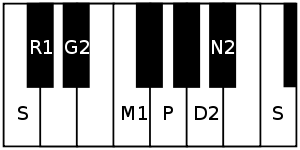Natakapriya
Natakapriya, (pronounced nāţakapriya, meaning the one dear to theatre) is a rāgam in Carnatic music (musical scale of South Indian classical music). It is the 10th melakarta rāgam (parent scale) in the 72 melakarta rāgam system. According to the Muthuswami Dikshitar school, the 10th melakarta rāgam is called Naţābharanam.[1][2]
| Arohanam | S R₁ G₂ M₁ P D₂ N₂ Ṡ |
|---|---|
| Avarohanam | Ṡ N₂ D₂ P M₁ G₂ R₁ S |
| Equivalent | Dorian ♭2 scale |
| Carnatic music |
|---|
Tanjavur-style Tambura |
| Concepts |
| Compositions |
| Instruments |
|
Structure and Lakshana

It is a sampoorna rāgam - rāgam having all 7 swarams. It is the 4th rāgam in the 2nd chakra Netra. The mnemonic name is Netra-Bhu. The mnemonic phrase is sa ra gi ma pa dhi ni.[1] Its ārohaṇa-avarohaṇa structure (ascending and descending scale) is as follows (see swaras in Carnatic music for details on below notation and terms):
- ārohaṇa : S R₁ G₂ M₁ P D₂ N₂ Ṡ[lower-alpha 1]
- avarohaṇa : Ṡ N₂ D₂ P M₁ G₂ R₁ S[lower-alpha 2]
The notes used in this scale are shuddha rishabham, sadharana gandharam, shuddha madhyamam, chathusruthi dhaivatham and kaisiki nishadham. Natakapriya is the shuddha madhyamam equivalent of Shadvidamargini, which is the 46th melakarta rāgam.
Asampurna Melakarta
Naţābharanam is the 10th Melakarta in the original list compiled by Venkatamakhin. The notes used in the scale are the same, but the scales are vakra (zig-zag usage in phrases of the scale). It is an shadava-sampurna raga (6 notes in ascending scale, while full 7 are used in descending scale).[3]
- ārohaṇa: S G₂ M₁ P N₂ D₂ N₂ Ṡ[lower-alpha 3]
- avarohaṇa: Ṡ N₂ D₂ N₂ P N₂ P M₁ G₂ G₂ R₁ R₁ S[lower-alpha 4]
Janya rāgams
Sindhu Bhairavi is one of the few janya rāgams (derived scales) associated with it. See List of Janya rāgams for a full list of its janyas.
Popular compositions
Here are some compositions set to this raga.
| Type | Composition | Composer | talam |
|---|---|---|---|
| Kriti | Maara jananeem Aashraye | Nallan Chakravartula Krishnamacharyulu | Adi |
| Kriti | Endukinta Kopamu | Tiruvottriyur Tyagayyar | Adi? |
| Kriti | Idi Samayamu | Mysore Vasudevachar | Roopaka |
| Kriti | Geeta Vadya Natana | Tanjavur Shankara Iyer | Adi |
| Kriti | Paripalaya Maam | Dr. M. Balamuralikrishna | Roopaka |
| Kriti | Pathuvedam Pūnda Nâtakapriyane | Kalyani Varadarajan | Adi |
Film Songs
Language:Tamil
| Song | Movie | Composer | Singer |
|---|---|---|---|
| Chinnanjiru Kiliye | Mundhanai Mudichu | Ilaiyaraaja | S. P. Balasubrahmanyam, S. Janaki |
Related rāgams
This section covers the theoretical and scientific aspect of this rāgam.
Natakapriya's notes when shifted using Graha bhedam, yields 3 other major melakarta rāgams, namely, Vachaspati, Charukesi and Gourimanohari. Graha bhedam is the step taken in keeping the relative note frequencies same, while shifting the shadjam to the next note in the rāgam. For an illustration, refer Graha bhedam on Vachaspati.
Notes
- Alternate notations:
- Hindustani: S Ṟ G̱ M P D Ṉ Ṡ
- Western: C D♭ E♭ F G A B♭ C
- Alternate notations:
- Hindustani: Ṡ Ṉ D P M G̱ Ṟ S
- Western: C B♭ A G F E♭ D♭ C
- Alternate notations:
- Hindustani: S G̱ M P Ṉ D Ṉ Ṡ
- Western: C E♭ F G B♭ A B♭ C
- Alternate notations:
- Hindustani: Ṡ Ṉ D Ṉ P Ṉ P M G̱ G̱ Ṟ Ṟ S
- Western: C B♭ A B♭ G B♭ G F E♭ E♭ D♭ D♭ C
References
- Ragas in Carnatic music by Dr. S. Bhagyalekshmy, Pub. 1990, CBH Publications
- Raganidhi by P. Subba Rao, Pub. 1964, The Music Academy of Madras
- Shree Muthuswami Dikshitar Keerthanaigal, by A Sundaram Iyer, Music Book Publishers, Mylapore, Chennai